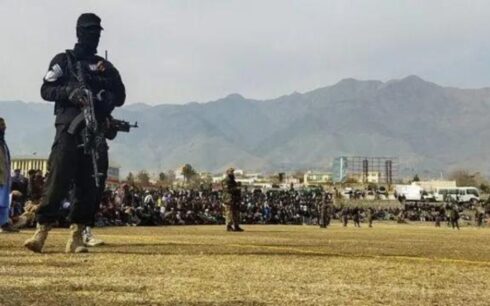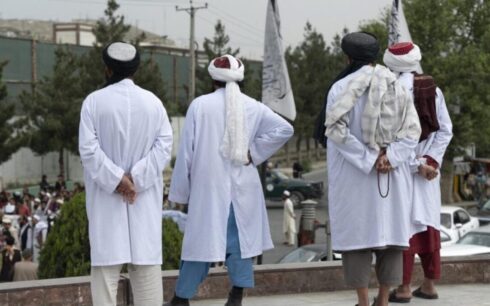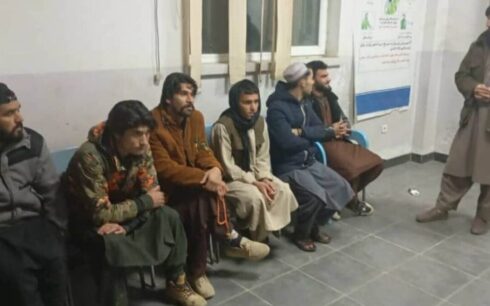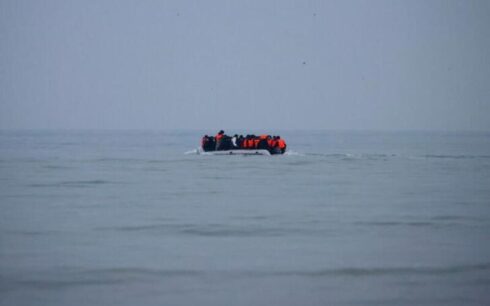The United Nations Secretary-General’s Special Representative for Afghanistan, Roza Otunbayeva, said on Wednesday that despite it being international women’s day, she has “few comforting messages to the women and girls in Afghanistan.”
Briefing the UN Security Council on her quarterly update on Afghanistan, Otunbayeva said while the Taliban claim to have united the country, they have in fact “severely divided it by gender.”
She said that at a time when Afghanistan needs all of its human capital torecover from decades of war, “half of the country’s potential doctors, scientists, journalists, and politicians are shut in their homes, their dreams crushed and their talents confiscated.”
She warned that unless restrictions are rolled back by the Taliban, “funding for Afghanistan is likely to drop if women were not allowed to work.”
Otunbayeva pointed out that if the amount of assistance is reduced, then the amount of US dollar cash shipments required to support that assistance will also decline. “Discussions of providing greater development-style assistance, including small infrastructure and policies to mitigate the effects of climate change, as well as planned political engagements, have halted as a result of these bans.”
She said while the UN understands the Taliban have a highly different worldview than any other government, “it is difficult to understand how any government worthy of the name can govern against the needs of half of
its population.”
According to her, some women had told the UN that they welcomed the Taliban coming to power because it ended the war, but these women soon began to lose hope. “They say their elimination from public life is no better
than fearing violent death.”
She told the council that the Afghan people continue to suffer deeply in other ways and the country remains the largest humanitarian crisis globally. Two-thirds of the population, 28 million people, will need humanitarian assistance this year to survive, which will cost $4.62 billion.
Almost half of the population, 20 million people, are experiencing crisis levels of food insecurity. Six million are one step away from famine-like conditions, she said.
She stated that the UN’s humanitarian action in the country is challenged by an increasingly complex access and security environment and that the bans on women working in NGOs are not the only serious obstacles to reaching vulnerable populations. “We are also concerned that national women staff working for the UN will also be banned,” she said.
“To date, we have seen efforts by the Taliban to prevent female staff coming to UN offices in five provinces. NGOs experience these restrictions to a much greater degree. In some provinces we have had to temporarily suspend providing assistance because local officials have placed unacceptable conditions on its distribution. In general, there has been a recent deterioration of the humanitarian space.”
She said she feared further restrictions by the Taliban on accessing the people could impede humanitarian efforts further.
According to Otunbayeva, December 2022 witnessed the highest number of access constraints. With the Taliban ban on women’s NGO employment in place, “humanitarian workers are forced to make uncomfortable and imperfect compromises in order to continue to save Afghan lives,” she said adding: “The absurdity of this situation requires no comment.”
She warned of growing concerns around Daesh, which was a threat to their workers’ safety and said the mission is concerned that the Taliban does not have the capacity to fully address emerging threats.
“Mitigating these threats will require more concerted and more united member state attention and is clearly an issue that the international community has in common with the de facto authorities,” she said.
She also highlighted the “erosion of other human rights”, that include ongoing extra-judicial killings, arbitrary arrests, detentions and torture carried out by the Taliban against former government officials and
security forces.
In addition she said there is no transparency regarding investigations of violations, and there is greater stifling of the media sector and civil society.
Otunbayeva went on to say that one year ago, the mission proposed to the Security Council that the end of the general conflict in 2021 was anopportunity to build a positive peace. She said UNAMA’s initial engagements with the Taliban authorities had been “relatively constructive and gave us cautious hope”.
In line with this, UNAMA began devising a pathway that would build confidence and clarify to the Taliban international expectations regarding their stated desire to rejoin the international community. But this changed, when the Taliban began “consistently taking decisions that negate this
stated goal.”
Otunbayeva told the Security Council that the accumulation of these decisions has been “a form of government that is simply unacceptable to the international community.”
Collective statements of condemnation and the imposition of sanctions have not had an effect, she said – in fact they may have hardened certain Taliban positions, she added.
“On the other hand, I do believe that there is a faction within the Taliban leadership, and across the movement, that does not agree with the current direction the leadership has taken. This faction understands that attention must be paid to the real needs of the people,” she said.
While this faction might eventually execute a change of direction, time is running short, she said.
“Global crises are multiplying. Demands on donor resources are multiplying as the availability of those resources diminishes. I see these dynamics with growing concern. I fear a history that repeats itself, with Afghanistan takingdecisions that increase its isolation.”
She also noted that UNAMA was “at a moment of political impasse where trust is in short supply.”
In conclusion, Otunbayeva stated that while most visible trends in the country are worrying and negative, the international community must begin constructing an agenda for discussion with the Taliban “that includes issues that matter to the Taliban” adding that despite the setbacks mentioned, she continues to assert “that there is no alternative [than UNAMA] to unified, patient and principled engagement that puts the needs and rights of the Afghan people first.”





